Conflict of the Ages
Conflict of the Ages
![]()
top
Acts of the Apostles Conflict of the Ages
The Acts of the Apostles was one of the last books written by Ellen G. White. It was
![]() published a few years before her death. It is one of the most illuminating volumes that came from her prolific pen. The average reader will find in it light for Christian witnessing. The message of the book is up to date, and its relevancy is reflected in the effort of the author to show that the twentieth century will witness a bestowal of spiritual power exceeding that of Pentecost. The work of the gospel is not to close with a lesser display of the Holy Spirit’s power than marked its beginning. {AA vi.1}
published a few years before her death. It is one of the most illuminating volumes that came from her prolific pen. The average reader will find in it light for Christian witnessing. The message of the book is up to date, and its relevancy is reflected in the effort of the author to show that the twentieth century will witness a bestowal of spiritual power exceeding that of Pentecost. The work of the gospel is not to close with a lesser display of the Holy Spirit’s power than marked its beginning. {AA vi.1}
That the reader might participate in this re-enactment of the glorious scenes of the early church and at the same time be preserved from the subtle counterfeits of the enemy of souls is the prayer and earnest wish of {AA i.2}
![]()
top
The Desire of Ages Conflict of the Ages
![]() It is God’s design that this longing of the human heart should lead to the One who
It is God’s design that this longing of the human heart should lead to the One who
alone is able to satisfy it. The desire is of Him that it may lead to Him, the fullness and fulfillment of that desire. That fullness is found in Jesus the Christ, the Son of the Eternal God. “For it was the good pleasure of the Father that in Him should all the fullness dwell;” “for in Him dwelleth all the fullness of the Godhead bodily.” And it is also true that “in Him ye are made full” with respect to every desire divinely implanted and normally followed. Conflict of the Ages
Haggai calls Him “the Desire of all nations,” and we may well call Him “the Desire of all ages,” even as He is “the King of ages.” Conflict of the Ages
It is the purpose of this book to set forth Jesus Christ as the One in whom every longing may be satisfied. There is many a “life of Christ” written, excellent books, large funds of information, elaborate essays on chronology and contemporaneous history, customs, and events, with much of the teaching and many glimpses of the many-sided life of Jesus of Nazareth. Yet it may be truly said, “the half has never been told.” Conflict of the Ages
It is not, however, the purpose of this work to set forth a harmony of the Gospels, or even to give in strictly chronological order the important events and wonderful lessons of the life of Christ; its purpose is to present the love of God as revealed in His Son, the divine beauty of the life of Christ, of which all may partake, and not to satisfy the desires of the merely curious nor the questionings of critics. But even as by the attraction of His own goodness of character Jesus drew His disciples unto Himself, and by His personal presence, by His sympathetic touch and feeling in all their infirmities and needs, and by His constant association, transformed their characters from the earthly to the heavenly, from the selfish to the sacrificing, from smallhearted ignorance and prejudice to largehearted knowledge and profound love for souls of all nations and races, even so it is the purpose of this book so to present the blessed Redeemer as to help the reader to come to Him face to face, heart to heart, and find in Him, even as did the disciples of old, Jesus the Mighty One, who saves “to the uttermost,” and transforms to His own divine image all those who come unto God by Him. Yet how impossible it is to reveal His life! It is like attempting to put upon canvas the living rainbow; into characters of black and white the sweetest music.
In the following pages the author, a woman of large and deep and long experience in the things of God, has set forth new beauties from the life of Jesus. She has brought many new gems from the precious casket. She opens before the reader undreamed-of riches from this infinite treasure house. New and glorious light flashes forth from many a familiar passage, the depth of which the reader supposed he had long before fathomed. To state it in brief, Jesus Christ is revealed as the fullness of the Godhead, the infinitely merciful Saviour of sinners, the Sun of Righteousness, the merciful High Priest, the Healer of all human maladies and diseases, the tender, compassionate Friend, the constant, ever-present and helpful Companion, the Prince of the House of David, the Shield of His people, the Prince of Peace, the Coming King, the Everlasting Father, the culmination and fruition of the desires and hopes of all the ages. Conflict of the Ages
Under the blessing of God this book is given to the world with the prayer that the Lord by His Spirit will make the words of this book words of life to many souls whose longings and desires are yet unsatisfied; that they “may know Him, and the power of His resurrection, and the fellowship of His sufferings,” and finally, throughout a blessed eternity, at His right hand, share in “that fullness of joy,” and “pleasures forevermore,” which will be the ripened fruitage of all those who find in Him the all in all, “the Chiefest among ten thousand,” and “the One altogether lovely.” Conflict of the Ages
In the hearts of all mankind, of whatever race or station in life, there are inexpressible longings for something they do not now possess. This longing is implanted in the very constitution of man by a merciful God, that man may not be satisfied with his present conditions or attainments, whether bad, or good, or better. God desires that the human shall seek the best, and find it to the eternal blessing of his soul. Conflict of the Ages
Satan, by wily scheme and craft, has perverted these longings of the human heart. He makes men believe that this desire may be satisfied by pleasure, by wealth, by ease, by fame, by power; but those who have been thus deceived by him (and they number myriads) find all these things pall upon the sense, leaving the soul as barren and unsatisfied as before.
![]()
top
The Great Controversy-1888 Conflict of the Ages
![]() Before the entrance of sin, Adam enjoyed open communion with his Maker; but since man separated himself from God by transgression, the human race has been cut off from this high privilege. By the plan of redemption, however, a way has been opened whereby the inhabitants of the earth may still have connection with Heaven. God has communicated with men by his Spirit, and divine light has been imparted to the world by revelations to his chosen servants. “Holy men of God spake as they were moved by the Holy Ghost.” 2 Peter 1:21. {GC88 c.2} Conflict of the Ages
Before the entrance of sin, Adam enjoyed open communion with his Maker; but since man separated himself from God by transgression, the human race has been cut off from this high privilege. By the plan of redemption, however, a way has been opened whereby the inhabitants of the earth may still have connection with Heaven. God has communicated with men by his Spirit, and divine light has been imparted to the world by revelations to his chosen servants. “Holy men of God spake as they were moved by the Holy Ghost.” 2 Peter 1:21. {GC88 c.2} Conflict of the Ages
During the first twenty-five hundred years of human history, there was no written revelation. Those who had been taught of God, communicated their knowledge to others, and it was handed down from father to son, through successive generations. The preparation of the written word began in the time of Moses. Inspired revelations were then embodied in an inspired book. This work continued during the long period of sixteen hundred years, from Moses, the historian of creation and the law, to John, the recorder of the most sublime truths of the gospel. {GC88 c.3} Conflict of the Ages
The Bible points to God as its author; yet it was written by human hands; and in the varied style of its different books it presents the characteristics of the several writers. The truths revealed are all “given by inspiration of God” (2 Timothy 3:16); yet they are expressed in the words of men. The Infinite One by his Holy Spirit has shed light into the minds and hearts of his servants. He has given dreams and visions, symbols and figures; and those to whom the truth was thus revealed, have themselves embodied the thought in human language. {GC88 c.4} Conflict of the Ages
The ten commandments were spoken by God himself, and were written by his own hand. They are of divine, and not human composition. But the Bible, with its God-given truths expressed in the language of men, presents a union of the divine and the human. Such a union existed in the nature of Christ, who was the Son of God and the Son of man. Thus it is true of the Bible, as it was of Christ, that “the Word was made flesh, and dwelt among us.” John 1:14. {GC88 c.5} Conflict of the Ages
Written in different ages, by men who differed widely in rank and occupation, and in mental and spiritual endowments, the books of the Bible present a wide contrast in style, as well as a diversity in the nature of the subjects unfolded. Different forms of expression are employed by different writers; often the same truth is more strikingly presented by one than by another. And as several writers present a subject under varied aspects and relations, there may appear, to the superficial, careless, or prejudiced reader, to be discrepancy or contradiction, where the thoughtful, reverent student, with clearer insight, discerns the underlying harmony. {GC88 d.1} Conflict of the Ages
As presented through different individuals, the truth is brought out in its varied aspects. One writer is more strongly impressed with one phase of a subject; he grasps those points that harmonize with his experience or with his power of perception and appreciation; another seizes upon a different phase; and each, under the guidance of the Holy Spirit, presents what is most forcibly impressed upon his own mind; a different aspect of the truth in each, but a perfect harmony through all. And the truths thus revealed unite to form a perfect whole, adapted to meet the wants of men in all the circumstances and experiences of life. {GC88 d.2}
God has been pleased to communicate his truth to the world by human agencies, and he himself, by his Holy Spirit, qualified men and enabled them to do this work. He guided the mind in the selection of what to speak and what to write. The treasure was intrusted to earthen vessels, yet it is, none the less, from Heaven. The testimony is conveyed through the imperfect expression of human language; yet it is the testimony of God; and the obedient, believing child of God beholds in it the glory of a divine power, full of grace and truth. {GC88 d.3} Conflict of the Ages
In his Word, God has committed to men the knowledge necessary for salvation. The Holy Scriptures are to be accepted as an authoritative, infallible revelation of his will. They are the standard of character, the revealer of doctrines, and the test of experience. “Every scripture inspired of God is also profitable for teaching, for reproof, for correction, for instruction which is in righteousness; that the man of God may be complete, furnished completely unto every good work.” 2 Timothy 3:16, 17, Revised Version. {GC88 d.4}
Yet the fact that God has revealed his will to men through his Word, has not rendered needless the continued presence and guiding of the Holy Spirit. On the contrary, the Spirit was promised by our Saviour, to open the Word to his servants, to illuminate and apply its teachings. And since it was the Spirit of God that inspired the Bible, it is impossible that the teaching of the Spirit should ever be contrary to that of the Word. {GC88 d.5}
The Spirit was not given—nor can it ever be bestowed—to supersede the Bible; for the Scriptures explicitly state that the Word of God is the standard by which all teaching and experience must be tested. Says the apostle John, “Believe not every spirit, but try the spirits whether they are of God; because many false prophets are gone out into the world.” 1 John 4:1. And Isaiah declares, “To the law and to the testimony; if they speak not according to this word, it is because there is no light in them.” Isaiah 8:20. {GC88 e.1}
Great reproach has been cast upon the work of the Holy Spirit, by the errors of a class that, claiming its enlightenment, profess to have no further need of guidance from the Word of God. They are governed by impressions which they regard as the voice of God in the soul. But the spirit that controls them is not the Spirit of God. This following of impressions, to the neglect of the Scriptures, can lead only to confusion, to deception and ruin. It serves only to further the designs of the evil one. Since the ministry of the Holy Spirit is of vital importance to the church of Christ, it is one of the devices of Satan, through the errors of extremists and fanatics to cast contempt upon the work of the Spirit, and cause the people of God to neglect this source of strength which our Lord himself has provided. {GC88 e.1} Conflict of the Ages
In harmony with the Word of God, his Spirit was to continue its work throughout the entire period of the gospel dispensation. During the ages while the Scriptures of both the Old and the New Testament were being given, the Holy Spirit did not cease to communicate light to individual minds, apart from the revelations to be embodied in the sacred canon. The Bible itself relates how, through the Holy Spirit, men received warning, reproof, counsel, and instruction, in matters in no way relating to the giving of the Scriptures. And mention is made of prophets in different ages, of whose utterances nothing is recorded. In like manner, after the close of the canon of Scripture, the Holy Spirit was still to continue its work, to enlighten, warn, and comfort the children of God. {GC88 e.1} Conflict of the Ages
Jesus promised his disciples, “The Comforter, which is the Holy Ghost, whom the Father will send in my name, he shall teach you all things, and bring all things to your remembrance, whatsoever I have said unto you.” “When he, the Spirit of truth, is come, he will guide you into all truth; … and he will show you things to come.” John 14:26; 16:13. Scripture plainly teaches that these promises, so far from being limited to apostolic days, extend to the church of Christ in all ages. The Saviour assures his followers, “I am with you alway, even unto the end of the world.” Matthew 28:20. And Paul declares that the gifts and manifestations of the Spirit were set in the church “for the perfecting of the saints, for the work of the ministry, for the edifying of the body of Christ; till we all come in the unity of the faith, and of the knowledge of the Son of God, unto a perfect man, unto the measure of the stature of the fullness of Christ.” Ephesians 4:12, 13. {GC88 e.1}
For the believers at Ephesus the apostle prayed, “That the God of Our Lord Jesus Christ, the Father of glory, may give unto you the Spirit of wisdom and revelation in the knowledge of him; the eyes of your understanding being enlightened; that ye may know what is the hope of his calling, and what … is the exceeding greatness of his power to us-ward who believe.” Ephesians 1:17-19. The ministry of the divine Spirit in enlightening the understanding and opening to the mind the deep things of God’s holy Word, was the blessing which Paul thus besought for the Ephesian church. {GC88 f.1} Conflict of the Ages
After the wonderful manifestation of the Holy Spirit on the day of Pentecost, Peter exhorted the people to repentance and baptism in the name of Christ, for the remission of their sins; and he said, “Ye shall receive the gift of the Holy Ghost. For the promise is unto you, and to your children, and to all that are afar off, even as many as the Lord our God shall call.” Acts 2:38, 39. {GC88 f.1} Conflict of the Ages
In immediate connection with the scenes of the great day of God, the Lord by the prophet Joel has promised a special manifestation of his Spirit.Joel 2:28. This prophecy received a partial fulfillment in the outpouring of the Spirit on the day of Pentecost; but it will reach its full accomplishment in the manifestation of divine grace which will attend the closing work of the gospel. {GC88 f.1} Conflict of the Ages
The great controversy between good and evil will increase in intensity to the very close of time. In all ages the wrath of Satan has been manifested against the church of Christ; and God has bestowed his grace and Spirit upon his people to strengthen them to stand against the power of the evil one. When the apostles of Christ were to bear his gospel to the world and to record it for all future ages, they were especially endowed with the enlightenment of the Spirit. But as the church approaches her final deliverance, Satan is to work with greater power. He comes down “having great wrath, because he knoweth that he hath but a short time.” Revelation 12:12. He will work “with all power and signs and lying wonders.” 2 Thessalonians 2:9. For six thousand years that master-mind that once was highest among the angels of God, has been wholly bent to the work of deception and ruin. And all the depths of Satanic skill and subtlety acquired, all the cruelty developed, during these struggles of the ages, will be brought to bear against God’s people in the final conflict. And in this time of peril the followers of Christ are to bear to the world the warning of the Lord’s second advent; and a people are to be prepared to stand before him at his coming, “without spot, and blameless.” 2 Peter 3:14. At this time the special endowment of divine grace and power is not less needful to the church than in apostolic days. {GC88 f.1} Conflict of the Ages
Through the illumination of the Holy Spirit, the scenes of the long-continued conflict between good and evil have been opened to the writer of these pages. From time to time I have been permitted to behold the working, in different ages, of the great controversy between Christ, the Prince of life, the author of our salvation, and Satan, the prince of evil, the author of sin, the first transgressor of God’s holy law. Satan’s enmity against Christ has been manifested against his followers. The same hatred of the principles of God’s law, the same policy of deception, by which error is made to appear as truth, by which human laws are substituted for the law of God, and men are led to worship the creature rather than the Creator, may be traced in all the history of the past. Satan’s efforts to misrepresent the character of God, to cause men to cherish a false conception of the Creator, and thus to regard him with fear and hate rather than with love, his endeavors to set aside the divine law, leading the people to think themselves free from its requirements, and his persecution of those who dare to resist his deceptions, have been steadfastly pursued in all ages. They may be traced in the history of patriarchs, prophets, and apostles, of martyrs and reformers. {GC88 g.1}
In the great final conflict, Satan will employ the same policy, manifest the same spirit, and work for the same end, as in all preceding ages. That which has been, will be, except that the coming struggle will be marked with a terrible intensity such as the world has never witnessed. Satan’s deceptions will be more subtle, his assaults more determined. If it were possible, he would lead astray the elect. Mark 13:22, Reevised Version.{GC88 g.1} Conflict of the Ages
As the Spirit of God has opened to my mind the great truths of his Word, and the scenes of the past and the future, I have been bidden to make known to others what has thus been revealed,—to trace the history of the controversy in past ages, and especially to so present it as to shed a light on the fast-approaching struggle of the future. In pursuance of this purpose, I have endeavored to select and group together events in the history of the church in such a manner as to trace the unfolding of the great testing truths that at different periods have been given to the world, that have excited the wrath of Satan, and the enmity of a world-loving church, and that have been maintained by the witness of those who “loved not their lives unto the death.” {GC88 g.1}
In these records we may see a foreshadowing of the conflict before us. Regarding them in the light of God’s Word, and by the illumination of his Spirit, we may see unveiled the devices of the wicked one, and the dangers which they must shun who would be found “without fault” before the Lord at his coming. {GC88 g.1}
The great events which have marked the progress of reform in past ages, are matters of history, well known and universally acknowledged by the Protestant world; they are facts which none can gainsay. This history I have presented briefly, in accordance with the scope of the book, and the brevity which must necessarily be observed, the facts having been condensed into as little space as seemed consistent with a proper understanding of their application. In some cases where a historian has so grouped together events as to afford, in brief, a comprehensive view of the subject, or has summarized details in a convenient manner, his words have been quoted; but except in a few instances no specific credit has been given, since they are not quoted for the purpose of citing that writer as authority, but because his statement affords a ready and forcible presentation of the subject. In narrating the experience and views of those carrying forward the work of reform in our own time, similar use has occasionally been made of their published works. {GC88 h.1}
It is not so much the object of this book to present new truths concerning the struggles of former times, as to bring out facts and principles which have a bearing upon coming events. Yet viewed as a part of the controversy between the forces of light and darkness, all these records of the past are seen to have a new significance; and through them a light is cast upon the future, illumining the pathway of those who, like the reformers of past ages, will be called, even at the peril of all earthly good, to witness “for the Word of God, and for the testimony of Jesus Christ.” {GC88 h.1} Conflict of the Ages
To unfold the scenes of the great controversy between truth and error; to reveal the wiles of Satan, and the means by which he may be successfully resisted; to present a satisfactory solution of the great problem of evil, shedding such a light upon the origin and the final disposition of sin as to fully make manifest the justice and benevolence of God in all his dealings with his creatures; and to show the holy, unchanging nature of his law, is the object of this book. That through its influence souls may be delivered from the power of darkness, and become “partakers of the inheritance of the saints in light,” to the praise of Him who loved us, and gave himself for us, is the earnest prayer of the writer. {GC88 h.1} Conflict of the Ages
E. G. W. Conflict of the Ages
Healdsburg, Cal.,
May, 1888.
![]()
top
Patriarchs and Prophets Conflict of the Ages
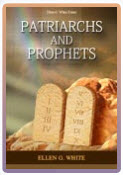 This volume treats upon the themes of Bible history, themes not in themselves new, yet here so presented as to give them a new significance, revealing springs of action, showing the important bearing of certain movements, and bringing into stronger light some features that are but briefly mentioned in the Bible. Thus the scenes have a vividness and importance that tend to make new and lasting impressions. Such a light is shed upon the Scripture record as to reveal more fully the character and purposes of God; to make manifest the wiles of Satan and the means by which his power will be finally overthrown; to bring to view the weakness of the human heart, and show how the grace of God has enabled men to conquer in the battle with evil. All this is in harmony with what God has shown to be His purpose in unfolding to men the truths of His word. The agency by which these revelations have been given is seen—when tested by the Scriptures—to be one of the methods God still employs to impart instruction to the children of men. {PP 19.1}
This volume treats upon the themes of Bible history, themes not in themselves new, yet here so presented as to give them a new significance, revealing springs of action, showing the important bearing of certain movements, and bringing into stronger light some features that are but briefly mentioned in the Bible. Thus the scenes have a vividness and importance that tend to make new and lasting impressions. Such a light is shed upon the Scripture record as to reveal more fully the character and purposes of God; to make manifest the wiles of Satan and the means by which his power will be finally overthrown; to bring to view the weakness of the human heart, and show how the grace of God has enabled men to conquer in the battle with evil. All this is in harmony with what God has shown to be His purpose in unfolding to men the truths of His word. The agency by which these revelations have been given is seen—when tested by the Scriptures—to be one of the methods God still employs to impart instruction to the children of men. {PP 19.1}
![]()
top
Prophets and Kings Conflict of the Ages
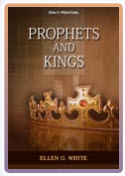 The Story of Prophets and Kings is the second in a series of five outstanding volumes spanning sacred history. It was, however, the last book of the series to be written, and the last of many rich works to come from the gifted pen of Ellen G. White. Through her seventy years of speaking and writing in America and abroad, Mrs. White ever kept before the public the larger significance of the events of history, revealing that in the affairs of men are to be detected the unseen influences of righteousness and evil—the hand of God and the work of the great adversary. {PK 9.1} Conflict of the Ages
The Story of Prophets and Kings is the second in a series of five outstanding volumes spanning sacred history. It was, however, the last book of the series to be written, and the last of many rich works to come from the gifted pen of Ellen G. White. Through her seventy years of speaking and writing in America and abroad, Mrs. White ever kept before the public the larger significance of the events of history, revealing that in the affairs of men are to be detected the unseen influences of righteousness and evil—the hand of God and the work of the great adversary. {PK 9.1} Conflict of the Ages
The author with deep insight in providential workings draws the curtain aside and reveals a philosophy of history by which the events of the past take on eternal significance. She expressed this philosophy in this way: {PK 9.2} Conflict of the Ages

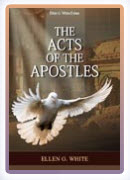

 In Chapter Four of Love Wins, Bell criticizes some statements of faith that he has taken from evangelical church websites that reflect Jesus’ teachings on Hell: “The unsaved will be separated forever from God in hell.” After giving a number of examples with which he feels uncomfortable, Bells states,
In Chapter Four of Love Wins, Bell criticizes some statements of faith that he has taken from evangelical church websites that reflect Jesus’ teachings on Hell: “The unsaved will be separated forever from God in hell.” After giving a number of examples with which he feels uncomfortable, Bells states, 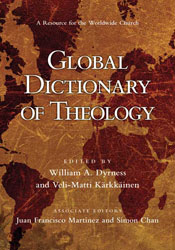 The emergent-friendly, Global Dictionary of Theology, makes a distinction between ‘Hopeful Universalism’ and ‘Convinced Universalism’:
The emergent-friendly, Global Dictionary of Theology, makes a distinction between ‘Hopeful Universalism’ and ‘Convinced Universalism’: Indeed, in the very preface of Love Wins, Bell contradicts Jesus’ teaching that few would actually be saved. Bell writes:
Indeed, in the very preface of Love Wins, Bell contradicts Jesus’ teaching that few would actually be saved. Bell writes: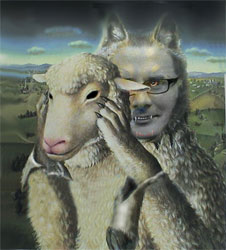 It is a sobering thought that Jesus went on to state in the verses immediately following His teaching on the narrow and broad roads, that false prophets would come in sheep’s clothing (Matthew 7:15-21). Such false prophets stand at the cross roads between the broad and narrow road, claiming to represent Christ, while pointing their followers toward the broad road that leads destruction, assuring them that it eventually leads to Heaven. Consider this for a minute. Isn’t this exactly what Rob Bell is doing?
It is a sobering thought that Jesus went on to state in the verses immediately following His teaching on the narrow and broad roads, that false prophets would come in sheep’s clothing (Matthew 7:15-21). Such false prophets stand at the cross roads between the broad and narrow road, claiming to represent Christ, while pointing their followers toward the broad road that leads destruction, assuring them that it eventually leads to Heaven. Consider this for a minute. Isn’t this exactly what Rob Bell is doing? Rob Bell not only redefines Hell by teaching that it will only be a temporary abode for those who want to leave later, but he redefines Hell by claiming that it is not so much about the after life, but it’s about what you make of the life here and now. In his book, Velvet Elvis, Bell had already stated this position:
Rob Bell not only redefines Hell by teaching that it will only be a temporary abode for those who want to leave later, but he redefines Hell by claiming that it is not so much about the after life, but it’s about what you make of the life here and now. In his book, Velvet Elvis, Bell had already stated this position: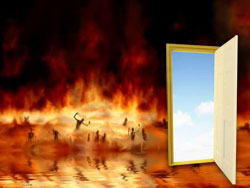 Rob Bell takes every possible liberty to deny reality and to either explain Hell away or get everyone into Heaven, regardless of his or her rejection of God and the Gospel. Bell not only empties Hell of God’s holy wrath, he creates an exit door from the inside out and claims that Hell is merely what we make it. He also claims that most of the imagery of future judgments in Hell were fulfilled on earth in AD 70 (p. 81).
Rob Bell takes every possible liberty to deny reality and to either explain Hell away or get everyone into Heaven, regardless of his or her rejection of God and the Gospel. Bell not only empties Hell of God’s holy wrath, he creates an exit door from the inside out and claims that Hell is merely what we make it. He also claims that most of the imagery of future judgments in Hell were fulfilled on earth in AD 70 (p. 81).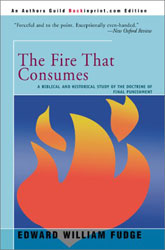 By claiming that the unrepentant wicked will have a chance to get to Heaven from Hell, Rob Bell has gone beyond that of Edward W. Fudge, who states in The Fire That Consumes,
By claiming that the unrepentant wicked will have a chance to get to Heaven from Hell, Rob Bell has gone beyond that of Edward W. Fudge, who states in The Fire That Consumes, 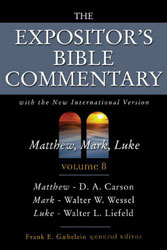 Biblical Scholar D.A. Carson, commenting on Matthew 25:46, says :
Biblical Scholar D.A. Carson, commenting on Matthew 25:46, says :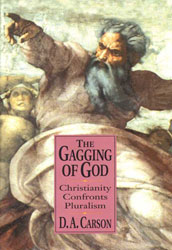 “What is hard to prove, but seems to me probable, is that one reason why the conscious punishment of hell is ongoing is because sin is ongoing.”
“What is hard to prove, but seems to me probable, is that one reason why the conscious punishment of hell is ongoing is because sin is ongoing.” There is hardly any wiggle room for a second chance in hell in these passages or anywhere in Scripture. Bell would have his readers believe of the book of Revelation that
There is hardly any wiggle room for a second chance in hell in these passages or anywhere in Scripture. Bell would have his readers believe of the book of Revelation that  May God give us the grace, in these times of apostasy, to hold fast to Jesus’ teachings and remain faithful to our loving and Holy Lord to the end. May God deliver His bride from the cotton candy Christianity that is endemic in Emergent Churches and among false prophets who lead the lost into believing they can put off repentance until after death.
May God give us the grace, in these times of apostasy, to hold fast to Jesus’ teachings and remain faithful to our loving and Holy Lord to the end. May God deliver His bride from the cotton candy Christianity that is endemic in Emergent Churches and among false prophets who lead the lost into believing they can put off repentance until after death.